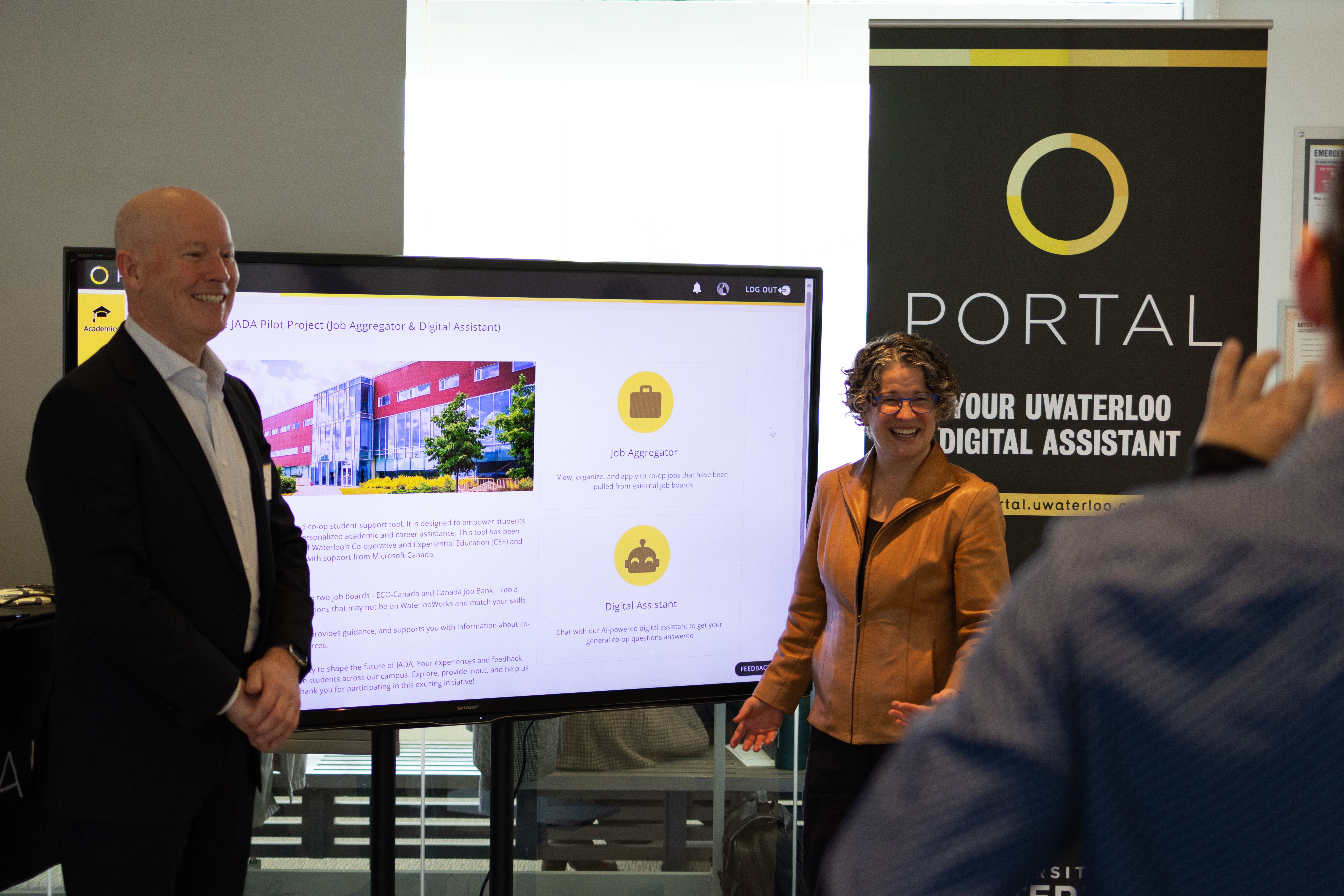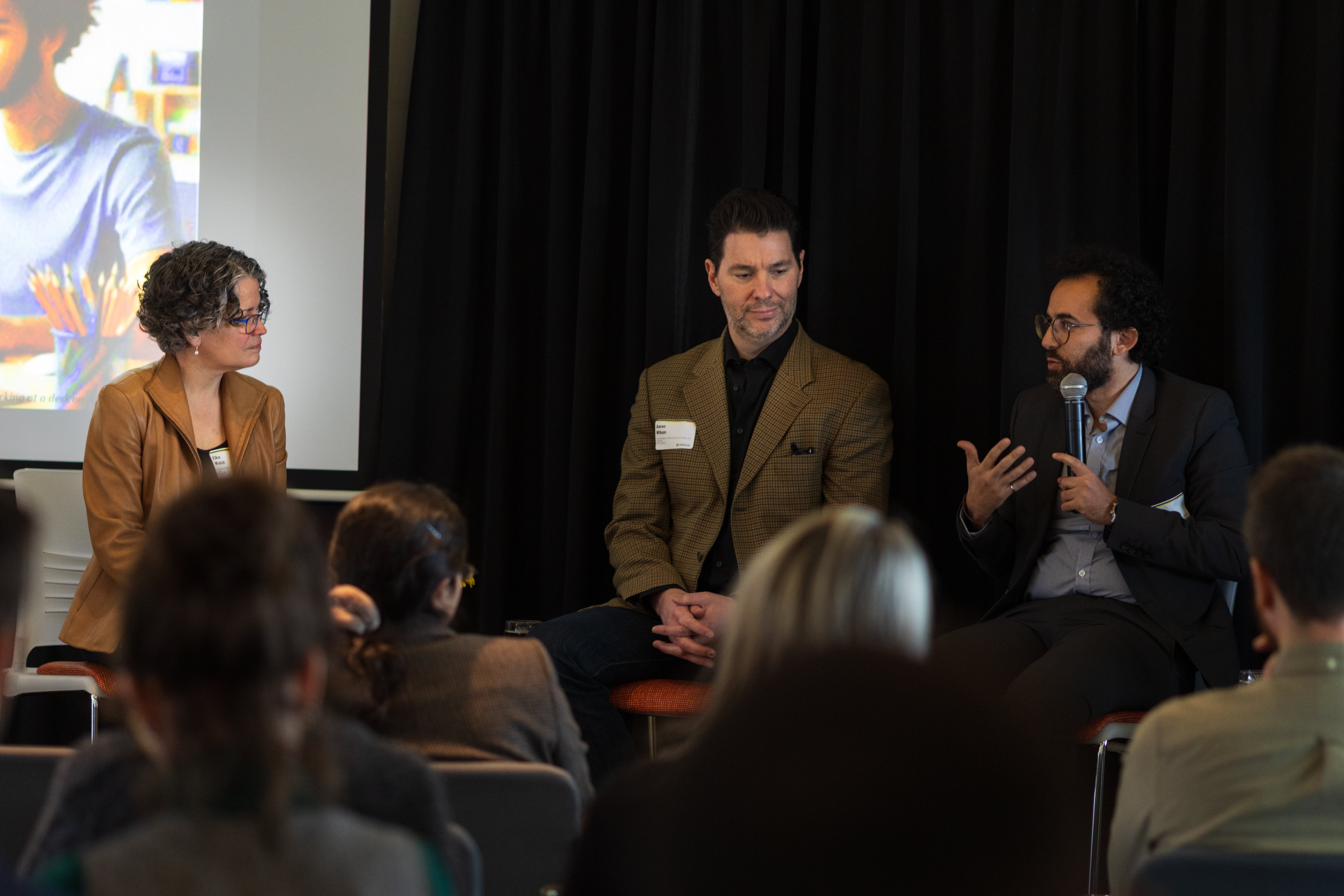Transforming work-integrated learning with AI tool for students
By: Matthew King (he/him)
The new tool, called JADA, uses AI features to enhance the co-op student experience and better prepare students for the future of work.
On Tuesday, Co-operative and Experiential Education (CEE) at the University of Waterloo announced a new AI-powered tool to help co-op students. JADA, short for job aggregator and digital assistant, is an innovative tool that helps students navigate the co-op process and showcases potential co-op jobs. In partnership with CEE, the University’s Information Systems & Technology (IST) group built the tool for the existing UWaterloo Portal using Microsoft’s Azure Open AI technology.
JADA leverages cutting-edge AI solutions to streamline the co-op job search, make vital information easily accessible and equip students with the tools necessary to navigate the world of work.
Partners in attendance to announce the launch of JADA included:
- Microsoft Canada
- ECO Canada
- Canada Job Bank (Employment and Social Development Canada)
- University of Waterloo Information Systems & Technology (IST)
The launch of JADA is a milestone in the evolution of work-integrated learning (WIL) in Canada, made even more significant by its alignment with the March celebration of WIL month. For students, JADA offers a chance to develop a competitive edge in a job market where AI is redefining opportunities and expectations.
Our ongoing collaboration with Microsoft continues to enhance work-integrated learning opportunities. It provides students with simplified access to co-op experiences and enables the development of advanced skills. Together, we're preparing the next generation of talent to thrive in a rapidly evolving digital economy.
The event featured a demo of JADA showcasing its cutting-edge AI solutions to streamline the co-op job search, make vital information easily accessible and equip students with the tools necessary to navigate the world of work.
“Layering AI agents, such as this groundbreaking work in partnership with Microsoft, on top of the Portal platform, is the next step in continuing to create the best digital experience for our students, enabling their success and expanding the institution’s use of efficient and modern technologies to meet the needs of our students today and in the future,” says Gregory Smith, chief information officer at the University of Waterloo.
“We are thrilled to continue our collaboration with the Co-operative and Experiential Education team at the University of Waterloo to bring AI innovation and new opportunities to students and faculty,” says Dr. Elka Walsh, Americas higher education transformation lead at Microsoft.
The job aggregator portion of JADA uses AI to pull potential jobs for students from collaborator job boards, like ECO Canada and Canada Job Bank. JADA serves up potential co-op jobs to students with a potential match rating based on their uploaded résumés. The digital assistant provides students with quick answers to their co-op-related questions, saving them valuable time.

Greg Milligan, senior account executive and Dr. Elka Walsh, Americas higher education transformation lead at Microsoft Canada with Job Aggregator Digital Assistant (JADA) screenshot
“This is the opportunity where we start to move from the art of the possible to the art of the actual and having a positive impact on the lives of students,” says Dr. Walsh. “When we help students with work-integrated learning and give those opportunities to them to see what's possible, we help ignite that innovation in them.”
The event featured a panel discussion about AI for future-ready talent featuring representatives from Microsoft, ECO Canada and Canada Job Bank. The panelists discussed the potential impact of AI on the future of work, the adoption of AI by students and how experiential learning can prepare students to help employers to adopt AI in their industry.

Panelists from left to right: Dr. Walsh; Aaron Wilson, vice president of marketing and sales at ECO Canada; Mina Riad, Job Bank product manager, Employment and Social Development Canada.
“It’s an incredible opportunity for students to come into the workplace with some insight and skills as early adapters,” says Aaron Wilson, vice president of marketing and sales at ECO Canada.
“If they come in with a great education and some insights, they’re going to be able to change culture and processes at organizations that will have huge, positive, ripple effects."
Panelists also discussed the shift in job requirements given the abilities of AI and the skills needed by students to be successful in the future of work.
“A lot of the work behind JADA was around building the partnerships, and AI couldn’t do that. There is a human piece there,” says Mina Riad, Job Bank product manager, Employment and Social Development Canada. “AI is going to force people to think more critically and have better emotional intelligence to be successful in their future careers.”
For students, built by students
Students were integral in the development of JADA. At launch, six co-op students worked on the tool as developers. During the development phase, students provided feedback on versions of the tool through testing and demonstrations. Currently, a selected group of students are using JADA, and CEE plans to expand access to more students in the coming months. JADA includes a feedback feature that adheres to AI responsible use best practices, allowing users to report concerns and flag issues.
I was really excited to hop on this project just because it had some sort of real impact for students on campus.
The event underscored the importance of CEE’s ongoing efforts to develop partnerships and foster collaboration to ensure student success. Through continued support, the next generation can develop the skills, knowledge and tools they need to succeed in the complex future of work.